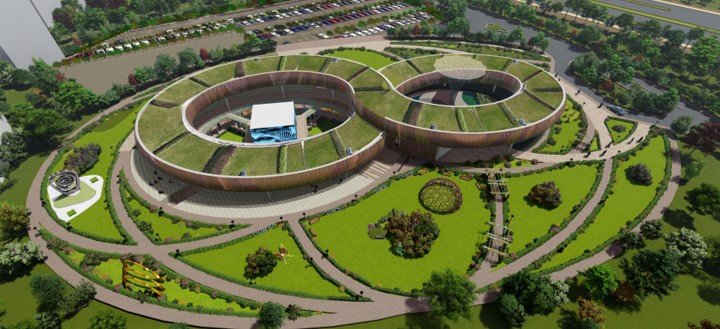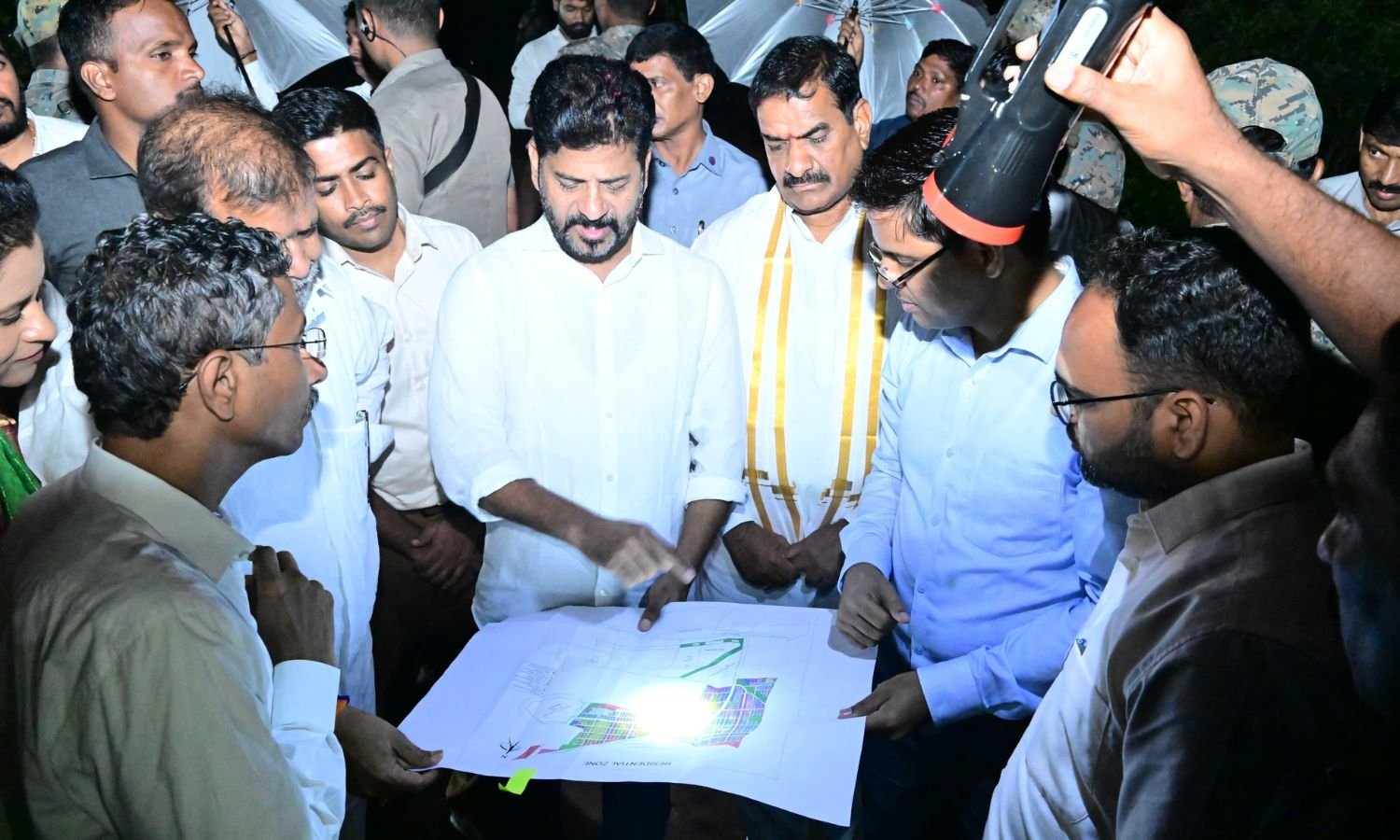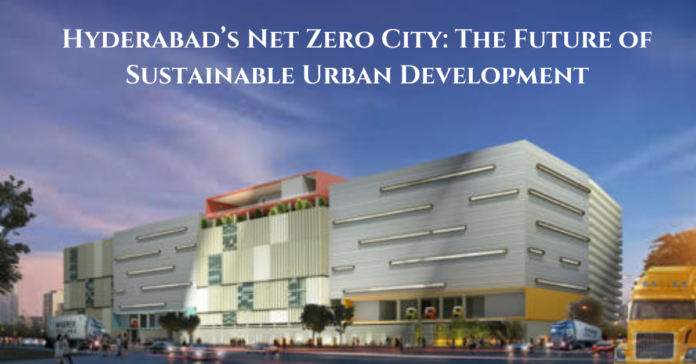Hyderabad’s Vision for a Net Zero City:
Hyderabad is rapidly emerging as a leading global city, attracting a wave of investments from both national and international companies. In line with this growth, the state government has set its sights on the city’s outskirts for transformative development. A key component of this initiative is the creation of a ‘Net Zero City,’ designed to be completely free from pollution and carbon emissions. This ambitious project represents a pivotal moment in Hyderabad’s journey towards sustainable urban development.

Government’s Commitment to Sustainable Development:
Under the direction of Chief Minister Revanth Reddy, the state government has unveiled plans to repurpose land initially allocated for the Pharma City project into the new ‘Net Zero City.’ The original Pharma City project aimed to acquire approximately 19,000 acres in Rangareddy district, with over 12,000 acres already secured. The revised plan involves leveraging this land for a series of multi-modal developments, including the creation of the eco-friendly ‘Net Zero City.’ This shift aligns with the Congress party’s revised strategy of developing Pharma City as a network of clusters rather than a single vast location.
Also Read: Telangana Skills University 2024: A Hub for Advanced Skill Development
Utilizing Land Acquired for Pharma City:
The ‘Net Zero City’ will be situated in Mir Khanpet, Kandukur Mandal, on land originally designated for Pharma City. This innovative urban development will focus on achieving 100% pollution and carbon emission neutrality. To accomplish this, the project will include extensive tree planting and other environmental measures aimed at absorbing carbon dioxide and other greenhouse gases. The global movement towards ‘Net Zero Cities’ highlights the significance of this initiative, as it aligns with international efforts to address global warming and promote sustainability.

Chief Minister’s Site Inspection and Future Plans:
Chief Minister Revanth Reddy recently visited the proposed site in Mir Khanpet to review the development plans for the ‘Net Zero City.’ During his visit, he provided constructive feedback and suggestions to enhance the project. In addition to the ‘Net Zero City,’ plans are underway to establish a Skill University in the same area, further contributing to the region’s growth and development. The establishment of the ‘Net Zero City’ is anticipated to increase the value of surrounding properties, offering potential economic benefits for current landowners.

Source: Hyderabadmailhttps://hyderabadmail.com/net-zero-city-hyderabad/
10 Essential Steps to Achieving Net Zero:
Creating sustainable urban environments is essential for mitigating climate change. Here are ten key strategies for transforming cities into sustainable, net zero emissions havens:
Decarbonize Urban Buildings:
Decarbonizing urban buildings is a crucial step towards achieving overall sustainability in city environments. This involves focusing on reducing emissions from both building operations and construction processes. To achieve this, cities must incorporate energy-efficient designs and materials, such as recycled steel and sustainable concrete. These materials not only reduce the carbon footprint associated with the construction phase but also improve the energy efficiency of buildings throughout their lifespan. By integrating advanced insulation techniques and energy-efficient windows, buildings can minimize the energy required for heating and cooling, thus reducing overall emissions. Adopting these practices helps to create buildings that are not only environmentally friendly but also economically beneficial in the long run, as they lead to reduced operational costs and lower energy consumption.

Also Read: Top 10 Mega Projects In Telangana 2024: A Detailed Overview
Embrace Energy Efficiency:
Embracing energy efficiency in existing urban structures is a fundamental component of sustainable development. Enhancing the energy performance of buildings involves retrofitting them with superior insulation, upgrading to energy-efficient lighting systems, and installing high-efficiency appliances. Implementing smart technology, such as automated lighting and heating systems, further optimizes energy usage by adapting to real-time needs and reducing waste. These improvements not only lower greenhouse gas emissions but also lead to significant cost savings for building owners and occupants. By prioritizing energy efficiency, cities can effectively reduce their overall energy consumption and contribute to a greener, more sustainable future.
Transform Urban Transportation:
Transforming urban transportation is essential for reducing city-wide emissions and improving air quality. This can be achieved by prioritizing the development of robust public transportation systems and creating infrastructure that supports pedestrians and cyclists. Investing in electric public transit systems and vehicles reduces reliance on fossil fuels and lowers carbon emissions. Additionally, designing cities to be more walkable and bike-friendly encourages residents to choose sustainable modes of transport, which further decreases vehicular emissions. Such initiatives not only contribute to a cleaner environment but also promote healthier lifestyles and create more vibrant, accessible urban communities.
Harness Renewable Energy Sources
Harnessing renewable energy sources is pivotal in advancing urban sustainability and reducing dependence on fossil fuels. By investing in solar, wind, and geothermal energy, cities can significantly improve air quality and support long-term environmental health. Installing solar panels on residential and commercial buildings allows for the generation of clean energy while integrating wind and geothermal power systems provides additional sustainable energy options. These investments help to decrease reliance on traditional energy sources, reduce greenhouse gas emissions, and foster a more resilient and sustainable energy infrastructure. Transitioning to renewable energy sources is a key strategy in achieving net zero emissions and ensuring a cleaner, greener future for urban areas.
Develop Urban Farming Initiatives:
Developing urban farming initiatives is a progressive approach to enhancing food security while reducing environmental impacts. By transforming unused urban spaces into productive farms, cities can cut down on the carbon emissions associated with food production and transportation. Urban farms provide fresh, locally grown produce, which minimizes the need for long-distance food transportation and supports local economies. Additionally, urban farming creates green jobs and revitalizes vacant areas, contributing to the overall well-being of the community. This approach not only helps to address the challenge of feeding a growing population but also promotes sustainability and resilience within urban environments.
Implement Water Conservation Practices:
Implementing effective water conservation practices is essential for sustainable urban living, particularly in areas prone to water scarcity. Strategies such as rainwater harvesting, greywater recycling, and the use of permeable surfaces can significantly reduce a city’s reliance on freshwater sources. These practices help to manage water resources more efficiently, mitigate the impacts of drought, and protect vital water supplies. By adopting these resourceful water management techniques, cities can better adapt to the challenges posed by climate change, ensuring a reliable and sustainable water supply for future generations.
Also Read: Marriott Tie up with Telangana to Set up GCC Centre in Hyderabad for over…
Expand and Maintain Green Spaces:
Expanding and maintaining green spaces is critical for enhancing urban environmental quality and resident well-being. Parks, gardens, and green roofs serve as crucial elements in improving air quality, mitigating urban heat island effects, and providing recreational areas for the community. Green spaces not only help to absorb carbon dioxide and other pollutants but also contribute to the mental and physical health of urban residents. Prioritizing the development and upkeep of these areas supports biodiversity, fosters a connection with nature, and enhances the overall livability of cities, making them more attractive and sustainable places to live.
Revolutionize Waste Management:
Revolutionizing waste management practices is vital for creating sustainable urban environments. Shifting from a traditional linear waste model to a circular approach involves viewing waste as a valuable resource rather than simply a disposal problem. Implementing comprehensive recycling and composting programs, as well as technologies that convert waste into energy, can significantly reduce landfill use and the need for new raw materials. This approach not only minimizes environmental impact but also contributes to a more efficient use of resources, supporting the goal of achieving net zero emissions and fostering a more sustainable urban economy.
Foster Community Involvement:
Fostering community involvement is essential for driving the success of sustainability initiatives in urban areas. Engaging residents through public awareness campaigns and educational programs helps to cultivate a culture of environmental responsibility and encourages sustainable practices. By involving communities in efforts such as energy conservation, recycling, and local food initiatives, cities can harness collective efforts to achieve broader sustainability goals. Active participation from residents ensures that sustainability efforts are widely supported and effectively implemented, contributing to a more resilient and environmentally conscious urban environment.
Transition to Electric Vehicles:
Transitioning to electric vehicles (EVs) is a crucial step in reducing urban carbon emissions and improving air quality. Cities can support this transition by investing in EV charging infrastructure, providing incentives for EV adoption, and integrating electric vehicles into public transportation systems. Promoting car-sharing programs and increasing the availability of EVs further decreases reliance on fossil fuels and lowers greenhouse gas emissions. Embracing electric vehicles not only contributes to cleaner air and reduced pollution but also helps cities move closer to achieving their net zero emissions targets, creating a more sustainable and eco-friendly urban landscape.
Conclusion:
The development of the ‘Net Zero City’ on Hyderabad’s outskirts marks a significant milestone in sustainable urban planning. This project aligns with global efforts to combat climate change by setting an example of eco-friendly development. By focusing on sustainability and innovation, the state government is not only addressing immediate environmental concerns but also laying the groundwork for a greener, more resilient future for Hyderabad and its residents.
Frequently Asked Questions:
The ‘Net Zero City’ project aims to develop a fully sustainable urban environment on the outskirts of Hyderabad, which will be free of pollution and carbon emissions.
The city will be developed in Mir Khanpet, Rangareddy district, on land previously acquired for the Pharma City project.
The city will feature extensive green spaces, advanced waste management systems, and renewable energy sources, creating an eco-friendly urban environment.
The development of the ‘Net Zero City’ is expected to increase the value of surrounding lands and contribute to the region’s economic and environmental sustainability.
The project’s timeline has not been specified, but it is expected to progress in phases as development plans are finalized and implemented.
Suggested Articles:
Marriott Tie up with Telangana to Set up GCC Centre in Hyderabad for over…
Key Highlights of Telangana Irrigation Projects 2024-25
Telangana Skills University 2024: A Hub for Advanced Skill Development



